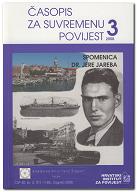Stranka prava (frankovci) u doba vladavine Narodnoga vijeća Slovenaca, Hrvata i Srba (listopad - prosinac 1918.)
THE PARTY OF RIGHT (FRANKISTS) DURING THE RULE OF THE NATIONAL COUNCIL OF THE SLOVENES, CROATS, AND SERBS (OCTOBER-DECEMBER 1918)
Author(s): Zlatko MatijevićSubject(s): History
Published by: Hrvatski institut za povijest
Keywords: Party of (Croatian state) right (Frankists); National council of Slovenians; Croats and Serbs; Croatian Diet; Austro-Hungarian Monarchy; World War I; State of Slovenians; Croats and Serbs
Summary/Abstract: During the First World War, none of the Entente powers sought after the total destruction of the Austro-Hungarian Empire and the creation of a Yugoslav state out of its ruins as a war aim. Nonetheless, the discontent of many of its Slavic peoples hastened the process of its dissolution. The justified discontent of Slavic political elites with the status of their lands, the dissatisfaction of Croat politicians with the Dualist constitution of the Monarchy which separated Civil Croatia from Dalmatia, and the undetermined constitutional status of Bosnia and Hercegovina grew into a problem which the Monarchy could not resolve. At the beginning of October 1918, members of the Croatian, Slovenian, and Serbian political elite formed the National Council of Slovenes, Croats, and Serbs in Zagreb, which carried out a transformation of the Monarchy, forming the State of the Slovenes, Croats, and Serbs. The Party of Right (Frankists), which did not participate in the organization of the National Council, attempted to solve the constitutional issue in the Monarchy’s south with the help of its rulers. Even though the Frankists won the agreement of the Emperor and King Charles I (IV) and the leading Magyar politicians (I. Tisza, A. Wekerle) to go about creating a third state entity (Zvonimir’s realm) within the boundaries of the Monarchy, this could not come to pass because the Monarchy was inexorably fragmenting into its constituent parts. The attempt of the Frankists to enter the National Council in order to influence its course was gently rejected. Voting in favour of the Croatian Sabor’s decision, prepared by the National Council, to declare the constitutional tie between the Kingdom of Croatia, Slavonia, and Dalmatia, Rijeka, and the Kingdom of Hungary and the Empire of Austria severed, the Frankists agreed to the solution of the Croat national question outside of the borders of the Monarchy. Arguing that this declaration completed the work of the Party of Right’s programme, the Frankist parliamentary club announced the dissolution of the Party of Right. Convinced that the goal of the National Council was not to maintain the independence of the State of Slovenes, Croats, and Serbs, but its hurried union with Serbia and Montenegro in a common state, Frankists of the Party of Right decided to reform their party and continue, in the new political environment, to fight for the preservation of Croatian state identity. After a determined protest against the union of the State of Slovenes, Croats, and Serbs with the Kingdom of Serbia into the Kingdom of Serbs, Croats, and Slovenes under the Karađorđević dynasty (1 December 1918), the Party of Right was subjected to repressive measures (arrests, publication bans).The Frankists continued to operate in the newly created Yugoslav state under a new name and a new political programme until the beginning of 1929, when King Alexander established a dictatorship and banned the operation
Journal: Časopis za suvremenu povijest
- Issue Year: 40/2008
- Issue No: 3
- Page Range: 1105,1118
- Page Count: 13
- Language: Croatian

